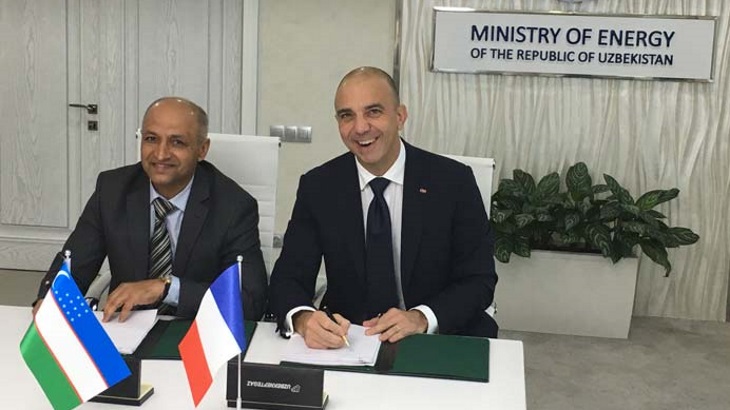Assystem, Uzbek energy ministry create JV

Uzbekistan intends to double its electricity production by 2030, raising its installed capacity from 13 to 27 gigawatts. Its new energy mix will include civil nuclear production capacities and new production infrastructure based on gas and wind power.
The JV agreement was signed by Stéphane Aubarbier, Assystem COO, and Zokir Abdujannarov, director of O'Zenergoinjiniring, on 25 September at the energy ministry's office in Tashkent.
"This project confirms Assystem’s commitment to developing safe, carbon-free energy across the globe, starting with the development of nuclear energy, and it demonstrates our ability to help countries and utilities with accelerating their energy transition," Aubarbier said.
The agreement provides for a joint venture to be set up between the Uzbek authorities and Assystem by the end of this year. Assystem says its role will be to design, coordinate and manage projects to enable the country’s new energy mix to be put in place, with new production infrastructure, electricity transmission and distribution networks.
Assystem said that increased electricity production is "both a condition and a corollary of" economic development in many countries. The challenge, it added, is to meet increased demand for energy while ensuring a sustainable energy supply and controlling greenhouse gas emissions.
Uzbekistan is one of the most energy-intensive economies in the world - 35% higher than neighbouring Kazakhstan and three times that of Germany, according to the World Bank. Its greenhouse gas emissions in 2014 were 214.7 MtCO2e, or 0.44% of the global total. The energy sector accounted for 89.4% of that figure. Its CO2 emissions that year were 105,213.56 mt. The country ratified the Paris Agreement on climate change in September last year and aims to reduce its CO2 emissions by 10% per unit of GDP by 2030 compared with the 2010 level.
As part of its energy transition, the country plans to build four nuclear power units.
_59102.jpg)
_49833.jpg)

.jpg)






_88592.jpg)

